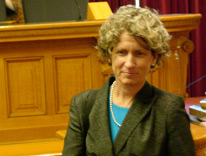 Lisa McKenzie, a research associate at the Colorado School of Public Health, testified before a congressional panel Wednesday urging stronger regulations to protect against possibly hazardous air emissions near hydraulic fracturing or fracking sites.
Lisa McKenzie, a research associate at the Colorado School of Public Health, testified before a congressional panel Wednesday urging stronger regulations to protect against possibly hazardous air emissions near hydraulic fracturing or fracking sites.
McKenzie, PhD, MPH, was one of a dozen witnesses to appear at a field hearing of the U.S. House Committee on Natural Resources’ Subcommittee on Energy and Mineral Resources. The panel traveled to Denver to investigate the possible impact of proposed new regulations on oil and gas exploration on public lands.
McKenzie, author of a recently published study on air emissions near fracking sites in Colorado’s rural Garfield County, testified that known carcinogens like benzene and other hydrocarbons were found near drilling operations. This increased the risk of contracting both acute and chronic illnesses ranging from respiratory problems and headaches to cancer, she said. Those living a half mile or less from the wells were at the greatest risk.
“We estimated higher cancer risks for residents living nearer to wells as compared to residents residing further from wells,” she said. “Benzene is the major contributor to lifetime excess cancer risk for both scenarios.”
The hearing, held in the ornate Old Supreme Court Chambers in the Capitol building, was contentious at times with Republican and Democratic lawmakers making often radically different claims about fracking – a process using the high powered injection of water and chemicals into a drilled area to release natural gas.
U.S. Rep. Doug Lamborn, (R-CO), said it was wrong for the federal government to set “one size fits all” regulations when each state has its own unique geology, economy and energy reserves. He then accused the Obama Administration of throwing up regulatory roadblocks to energy independence.
But Congressman Rush Holt, (D-N.J.), said that gas development on public lands had more than doubled in the last 20 years and that 90 percent of all wells were now fracking wells.
Holt cited McKenzie’s study showing the number of “toxic hydrocarbons” near the homes of those living near the gas wells. “It is appropriate that we take a close look at this technology,” he said.
Witnesses included representatives from the oil and gas industry, the Rocky Mountain Farmers Union, the chairman of the Colorado House Agriculture, Livestock and Natural Resources Committee, the policy director for the Wyoming governor’s office, a grassroots citizens group called Erie Rising and the director of the Utah Office of Public Land Coordination. All agreed that regulation was needed, but the question was whether the state or federal government should craft those rules. One witness, Mesa County Commissioner Craig Meis, repeatedly referred to the “hysteria” surrounding fracking, saying it was being exploited by environmental groups “as a fundraising opportunity.”
Rep. Holt questioned the concept that each state needs different oil and gas regulations.
“Do the people of Colorado have a different physiology from those in other states?” he asked. “Do they react differently to polluted air and water?”
McKenzie’s study, entitled `Human Health Risk Assessment of Air Emissions from Development of Unconventional Energy Sources’ published in the peer-reviewed Science of the Total Environment, was based on three years of well monitoring in Battlement Mesa, a town of 5,000 in Garfield County.
The report has garnered intense national and international media coverage because it’s one of the few studies focusing on air rather than water pollution near fracking sites.
McKenzie concluded her testimony Wednesday with a series of recommendations.
She said air emissions from hydraulic fracturing sites should be reduced especially during the well completion phase when most of the hydrocarbons escape. She endorsed the new regulations from the Environmental Protection Agency which, among other things, require some emissions to be burned off. And she urged more studies to find ways to reduce and prevent exposures to these emissions and to determine the effectiveness of new regulations aimed at protecting public health.




